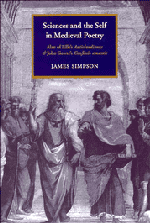 Sciences and the Self in Medieval Poetry
Sciences and the Self in Medieval Poetry Published online by Cambridge University Press: 15 December 2009
THE PLACE OF POETRY AMONG THE SCIENCES
The preceding six chapters have illuminated the parallelisms between the Anticlaudianus and the Confessio amantis: both poems are fables of the soul, in which the impetus of the soul to reach its own perfection, or form, determines the narrative form taken by both poems – in both works the form of the soul determines the form of the narrative. Alan and Gower are writing in humanist traditions of self-information, in which knowledge of the self requires ‘scientific’ information, by which the soul can place itself in the cosmos and in society; accordingly, both poems work within disciplinary structures, in which politics plays a prominent role. Alan the Neo-Platonist, certainly, is working within a ‘broader’ spectrum of disciplines, which seeks to realize and harmonize the inter-relations between the practical and the theoretical sciences, whereas Gower is writing within a genuinely Aristotelian hierarchy, with politics being the science to which ethics and economics tend.
What place can there be for the ‘science’ of poetry in poems that give such high profile to ‘scientific’ knowledge, and whose very structure is determined, in part, by hierarchies of the sciences? In the relatively rare instances where poetry is given a place within hierarchies of knowledge from the twelfth to the fourteenth centuries, that place tends to be fairly humble. In poems that are so sensitive to hierarchies of knowledge, we might therefore expect poetry to fare badly.
To save this book to your Kindle, first ensure [email protected] is added to your Approved Personal Document E-mail List under your Personal Document Settings on the Manage Your Content and Devices page of your Amazon account. Then enter the ‘name’ part of your Kindle email address below. Find out more about saving to your Kindle.
Note you can select to save to either the @free.kindle.com or @kindle.com variations. ‘@free.kindle.com’ emails are free but can only be saved to your device when it is connected to wi-fi. ‘@kindle.com’ emails can be delivered even when you are not connected to wi-fi, but note that service fees apply.
Find out more about the Kindle Personal Document Service.
To save content items to your account, please confirm that you agree to abide by our usage policies. If this is the first time you use this feature, you will be asked to authorise Cambridge Core to connect with your account. Find out more about saving content to Dropbox.
To save content items to your account, please confirm that you agree to abide by our usage policies. If this is the first time you use this feature, you will be asked to authorise Cambridge Core to connect with your account. Find out more about saving content to Google Drive.